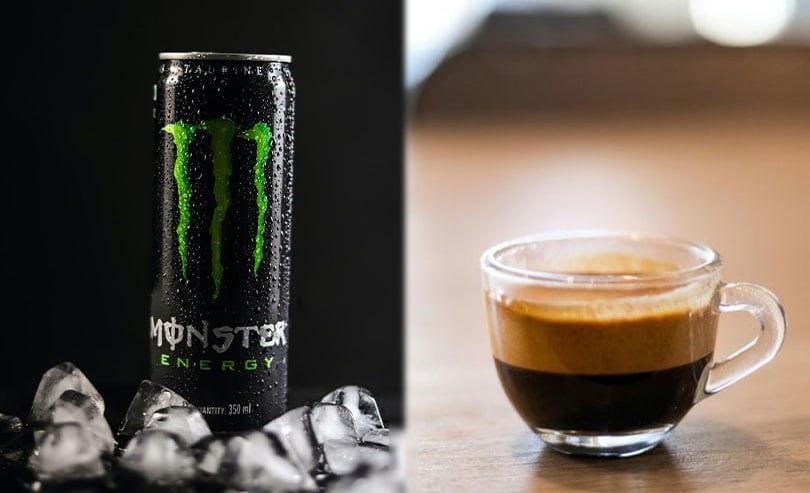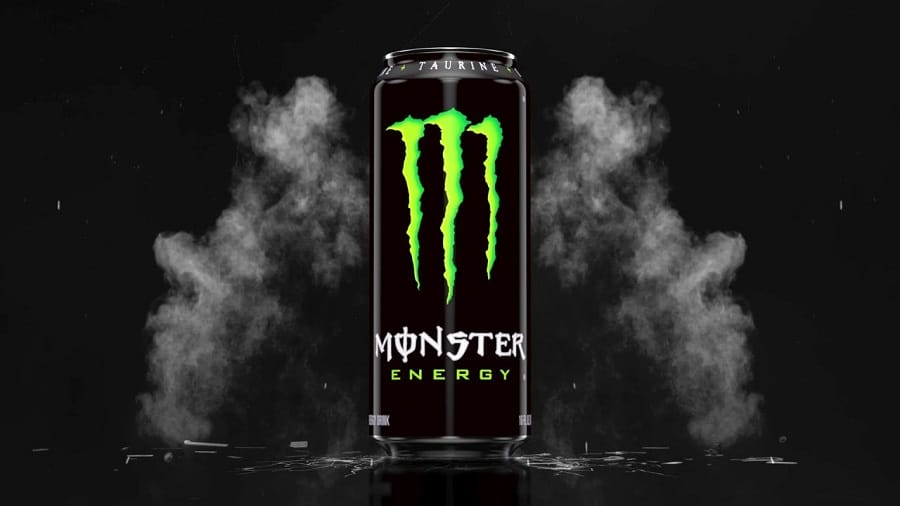Compare the caffeine amounts of various beverages with Monster Energy Drinks, both the Original and Mega sizes. Learn what goes into Monster Energy drinks and how much caffeine they contain so you can make the right choice.
Quick Preview show
Energy drinks have gained immense popularity in recent years as they are believed to provide an instant boost of energy and increased alertness. Among these energy drinks, Monster Energy is one of the most widely consumed beverages. However, it is crucial to understand the caffeine content and other ingredients in Monster Energy before consuming it regularly. This article aims to provide information on the caffeine content and ingredients of Monster Energy and compare it to other popular beverages. Read on to discover more about monster energy caffeine content.
Comparing The Caffeine Showdown: Monster Energy Vs. Coffee

When it comes to caffeine content, Monster Energy and coffee have similar amounts of caffeine per serving. However, the caffeine content of coffee can vary significantly based on various factors such as roast type, brewing method, and bean variety.
For instance, the following are types of coffee beverages and their caffeine content:
- Brewed Coffee: A regular 8-oz. serving of brewed coffee contains approximately 100 mg of caffeine.
- Espresso-based Beverages: Espresso-based beverages like cappuccinos and lattes contain roughly 60-65 mg of caffeine per 1.5 oz serving. While espresso has a higher caffeine concentration than brewed coffee, its smaller serving size means that it contains less caffeine overall.
It’s crucial to be mindful of the caffeine content and serving size of your preferred beverage, whether it’s an energy drink or a cup of coffee, to avoid any unpleasant side effects.
Monster Energy Ingredients

Original Monster Energy contains a range of ingredients that work together to provide an energy boost. Here are some of the key ingredients:
- Salt
- D-glucuronolactone
- Inositol
- Carbonated Water
- Sugar
- Glucose
- Citric Acid
- Natural Flavors
- Taurine
- Sodium Citrate
- Color Added
- Panax Ginseng Extract
- L-carnitine L-tartrate
- Caffeine
- Guarana Extract
- Pyridoxine Hydrochloride (Vit. B6)
- Riboflavin (Vit. B2)
- Maltodextrin
- Cyanocobalamin (Vit. B12)
- Benzoic Acid (Preservative)
- Niacinamide (Vit. B3)
- Sucralose
Comparing Monster Caffeine Content To Other Popular Beverages
![]()
When it comes to choosing a drink that can provide a quick boost, caffeine content is often a significant factor to consider. Let’s take a look at how Monster’s caffeine content stacks up against other popular beverages.
1. Energy Drinks:
Energy drinks like Monster and Rockstar are a popular choice for those looking for a quick boost. These drinks have comparable caffeine levels, with Monster containing about 160mg of caffeine in a 16 fl. oz. serving. However, if you’re seeking a stronger jolt, Bang Energy takes the cake with a whopping 300mg of caffeine in a single 16 fl. oz. serving.
2. Sodas:
While Monster’s caffeine content falls within the average range for energy drinks, it’s significantly higher than most sodas on the market. For those looking to curb their caffeine intake, Coca-Cola and Pepsi may be the way to go, with a mere 45mg and 50mg of caffeine, respectively, per 16 fl. oz. serving.
3. Coffee and Tea:
Coffee and black tea may seem like healthy alternatives, but they can pack a punch with 190mg and 95mg of caffeine in a 16 fl. oz. serving, respectively.
Ultimately, it’s all about finding the right balance and choosing a beverage that fits your individual needs and preferences.
Different Forms Of Caffeine And Their Health Effects
When it comes to caffeine, the form in which it is consumed plays a crucial role in determining its health effects. Here are some examples:
1. Freshly brewed black coffee:

- Ofers more health benefits than instant coffee loaded with sugar and cream
- Contains antioxidants that can help reduce inflammation and lower the risk of chronic diseases such as heart disease and diabetes
- Can improve cognitive function and boost energy levels
2. Energy drinks like Monster

- Contains high amounts of sugar that can offset any potential health benefits of caffeine
- An astonishing 16-oz. can of Monster contains 54 grams of various sugars, which surpasses the daily recommended limit set by the American Heart Association
- Can lead to increased blood pressure, heart palpitations, and anxiety
Therefore, to maximize the health benefits of caffeine, it’s essential to consider the form in which it is consumed. Opt for freshly brewed coffee or tea instead of sugary energy drinks to reap the benefits of caffeine without the negative health effects.
How Long Does It Take For The Body To Process Caffeine From Energy Drinks?
When looking for a quick boost of energy, many people turn to energy drinks like Monster or a cup of coffee. However, the effects of energy drinks are short-lived and are often followed by a comedown or crash.
While the duration of this effect can vary from person to person, it is generally agreed that the body takes around 12 hours to process all the caffeine from an energy drink, with a peak lasting between 15 to 45 minutes. As a result, the energy provided by an energy drink like Monster usually starts to decline within an hour, leading to feelings of fatigue and lethargy.
Risks Of Continuous Monster Energy Drink Consumption

There are several reasons why consuming Monster energy drinks on a continuous basis may not be a sustainable approach to performance enhancement. These include:
- Short-Lived Effects: While energy drinks like Monster can provide an initial cognitive and physical boost, the effect is often short-lived and may require continuous consumption to maintain the energy level.
- Risk Of Exceeding Recommended Doses: Continuous consumption of Monster energy drinks can increase the risk of exceeding the daily recommended dose of sugar and caffeine. This, in turn, can have adverse health effects, such as high blood pressure, heart palpitations, and anxiety.
- Harder Crash: The harder crash at the end of the energy boost can have negative consequences on mental and physical performance, making it an unsustainable approach to performance enhancement.
Conclusion
Monster Energy Drinks contain high amounts of caffeine and sugar and are popular for their quick energy boost. However, it is important to be mindful of their caffeine content and serving size to avoid any unpleasant side effects. When compared to other popular beverages, Monster Energy’s caffeine content is higher than most sodas on the market but falls within the average range for energy drinks. The safety limit for caffeine intake is 400 mg per day for healthy adults, and the form in which caffeine is consumed plays a crucial role in determining its health effects.